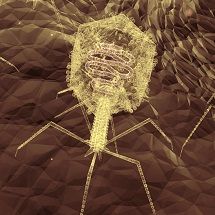Article
Deploying Bacteriophages Against Clostridium Difficile Infections
Author(s):
Phages were originally discovered and administered as a treatment a century ago, but fell by the wayside in favor of antibiotics. "But now we have this strong driver of antimicrobial resistance. There is a big resurgence in this area, so it’s an exciting time to be looking at these organisms,†says Martha Clokie.

Researchers at the University of Leicester are working to develop specific combinations of bacteriophages to combat Clostridium difficile (C. difficile) infections. C. difficile infections are common and sometimes dangerous diarrheic conditions that arise as a result of bacterial imbalance in the intestines, usually brought on by prolonged antibiotic treatment.
C. difficile can be passed in hospitals, and in the most extreme cases, can cause the formation of holes in the intestines, which can be fatal.
Bacteriophages, as Leicester researcher Martha Clokie explains in a study-accompanying video, are “bacteria eaters,” viruses that devour bacteria. A startling 10% of C. difficile sufferers die due to inadequate treatment. The right combination of bacteriophages could be useful against C. difficile, especially in an era of increasing antibiotic resistance.
The research team, through a process of extensive experimentation and elimination, came up with a combination of phages that was able to fight 12 of the 13 C. difficile variants most common in the UK, and that was effective against many emerging strains.
The lab was able to demonstrate that their phage combinations could kill C. difficile entirely and shield against its reappearance and development of resistance. An orally administered combination began to slow the infection’s spread 36 hours after delivery.
Clokie, in the accompanying video, comments that phages were originally discovered and administered as a treatment a century ago, but fell by the wayside in favor of antibiotics. “So you’ve got a lot of making up to do. But now we have this strong driver of antimicrobial resistance. There is a big resurgence in this area, so it’s an exciting time to be looking at these organisms,” she said.
A Professor of Microbiology at Leicester’s Department of Infection, Immunity and Inflammation, Clokie is the leader of the study, which is published in Antimicrobial Agents and Chemotherapy.
Related Coverage
Latest News and Updates on C. Difficile Infection Management and Treatment
Blame the Dog: Tracking C. Difficile Infections
CDC Plans Program to Combat Clostridium Difficile Infections





